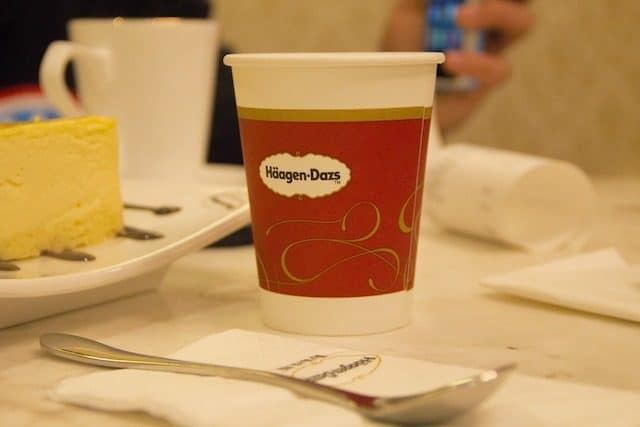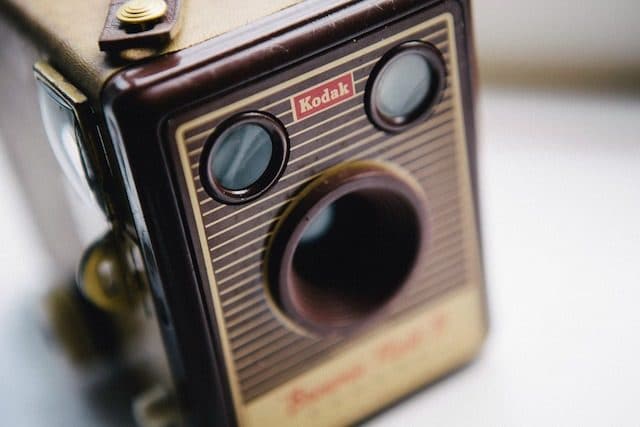If the omniscient tome known colloquially as the Big Ol’ Book of Words for Nerds, and officially as The Dictionary, is to be believed, every word located within the well-worn pages of this bastion of the English language means something. But actually, there are a bunch of words many of us use every single day that don’t mean a dang thing, and were either pulled out of thin air by a random person many years ago or willed into existence by a committee of ad men in crisp, pristine suits purely to sell a product. Thanks to years — and even centuries — of frequent use, many of these wholly made-up words have since entered into the popular lexicon and continue to be used in conversation and commercials today.
Since language is an ever-evolving beast, this isn’t necessarily a bad thing, but it sure stands as a testament to the power of human ingenuity that most people don’t realize the only meaning any of the following words have is the meaning we have since ascribed to them.
10. Wi-Fi was made up because the real word wasn’t catchy enough

It’s commonly asserted that the word Wi-Fi stands for wireless fidelity, much in the same way the word Hi-Fi stands for high fidelity. Which makes sense, right? However, according to one Dr. Alex Hills, who is partially responsible for the creation of the first Wi-Fi networks in history, that’s simply not the case. The word Wi-Fi was instead something wireless engineers coined solely for marketing reasons. Hills says the name was needed because because the technical specification the newly created wireless networks used (called IEEE 802.11) didn’t exactly roll off the tongue. To be fair to Dr Hills, he kind of has a point and it’s hard to imagine the technology would have caught on with such an unintuitive and lame-ass name.
In his book, Wi-Fi and the Bad Boys of Radio, Hills recalls that members of the emergent wireless industry chose the word Wi-Fi mostly because it sounded catchy, though he does note that the natural link between Hi-Fi and Wi-Fi probably helped cement it in the minds of the public. You know, even though the two words have nothing to do with one another and are in no way linked.
9. Haagen-Dazs was made up by a guy at his kitchen table

According to Reuben Mattus, the original creator of the Häagen-Dazs brand, he came up with the now iconic name of his pillowy-soft ice cream after spending several hours saying nonsense words aloud until he found one he thought sounded neat. Purported to be a Danish word on early Häagen-Dazs packaging — the packaging even included a map of Denmark because lying to your customers apparently wasn’t illegal back then — the word has no translation in any language and especially not in Danish. Something anyone familiar with the Danish language can tell at a glance, seeing as Danish language doesn’t make use of umlauts. Like, at all.
Mattus, a Polish Jew, would later note that he chose a name that “sounded” Danish to the untrained ear as a subtle tribute to the country of Denmark, which he greatly respected for its many WW2-era efforts to save Jews from persecution. That said, Mattus would also later note that the name was chosen to make it stand out to consumers, reasoning that a foreign-sounding name suggested an intangible air of quality to his ice cream that consumers would innately pick up on when browsing store shelves.
8. Idaho was a word someone pulled out of thin air

According to historians, the name of the Potato State has no meaning in any known language and it was, as far as anyone can tell, just a made up word suggested by an early territorial representative for the area named B.D. Williams. The story goes that long before Idaho was called, well… Idaho, someone proposed naming it Jefferson. Republicans voted against this and Williams instead suggested Idaho, claiming that it was an old Indian word meaning “Gem of the Mountains.”
Almost immediately, this was debunked by Oregon senator Joseph Lane, who correctly asserted “No Indian tribe in the nation has that word … It is a corruption certainly, a counterfeit, and ought not to be adopted.” Amazingly, even after Williams acknowledged that Idaho was a made up nonsense word likely coined by his predecessor George M. Willing, it still caught on. So much so that the people of proto-State began using it anyway, applying the name to both a steamboat and a mine, among other things. Before long the word had entered the collective conscious to the extent that even though people knew Idaho didn’t mean anything, they still voted for it being the official name of the new State. History is fun like that sometimes.
7. SOS doesn’t mean anything, which is kind of the point

While many assume that SOS stands for Save Our Souls, or Save Our Ship, or something similar, the truth is that the abbreviation doesn’t really stand for anything. Which, as Reader’s Digest handily points out, is kind of the point. To explain, as you may or may not know, the universal signal for distress in Morse code is three dots, three dashes, and a further three dots. Officially introduced in 1905 by the German government, this sequence of signals is difficult to misinterpret and easy to recognize, even to the untrained ear. This was seen as being incredibly important as it allowed ships in foreign waters to signal that they were in need of help without having to worry about a language barrier. A pervasive problem before the idea of a universal signal for distress was introduced that saw many boats sink before help could arrive, as is wont to happen when you’re effectively screaming via a series of beeps at someone who doesn’t understand you at all.
Now technically this signal can be expressed in a number of ways, with IJS, SMB, and VTB all resulting in the same string of dots and dashes when expressed Morse Code. However, SOS eventually won out simply because it was so visibly distinctive and the fact it can be read from any direction, allowing stranded sailors to additionally type SOS out with rocks and stuff.
6. Zumba was made up over lunch in a single afternoon

A popular misconception about the popular power-posing dance exercise classes known as Zumba is that the word has its roots in Spanish, which is partially true, but not really. You see, prior to being known as Zumba, the fitness program was known as “Rumbacize,” a portmanteau of Rumba (which means “to party” in Spanish) and Jazzercise, a similar exercise program popular in the ’90s (ask your parents about it!). Problems arose, though, when the creator of Zumba, Alberto Perez, tried to trademark the term and found that it’d had already been stealthily registered by the owner of a gym he taught Rumbacize classes at.
Undeterred, Perez and his business partners wiled away an afternoon riffing on the word rumba to find something that hit the ear just right. The word they eventually settled on, as you can probably guess, was Zumba. On its own website the Zumba company openly acknowledges that zumba is “arbitrary and fanciful word” they made up, which hasn’t stopped people assuming that it must mean something in at least one language.
5. Ginsu was invented to make knives made in Ohio seem Japanese
Ginsu is a word made famous by a bunch of cheesy commercials from the 1980s designed to do one thing and one thing only: sell whoever was watching some fancy, overpriced knives. Although the commercials played into the katana-like sharpness of the knives and leaned heavily into Japanese imagery, including using fonts seemingly ripped straight out of a Japanese B-movie about ninjas, all Ginsu Knives are designed and manufactured by the Scott Fetzer company in Ohio. According to a Washington Post profile of the man who coined the word, Arthur Schiff, this was a deliberate decision made to convince the public that “no matter how many knives they already owned, [Ginsu knives] were something special.” As an aside, Schiff often claims to have coined the word in his sleep and never once revealed what, if anything, it was supposed to mean beyond “sounding” sort-of Japanese.
The same can be said of Schiff’s partners in the Ginsu empire, Edward Valenti and Barry Becher — the latter of whom would reportedly respond to the question “what does Ginsu mean?” by smiling and stating “I never have to work again.“
4. Kodak was made up by a guy who loved the letter K

Given the multitude of advancements to the world of camera technology Kodak as a company is responsible for, you wouldn’t be remiss to think the word “Kodak” itself had some deeper meaning. For example, one popular theory is that the word Kodak is an onomatopoeic representation of the sound a camera shutter makes when you take a photo, or perhaps a nod to the fact you could use an especially large one of their cameras to fend off an aggressive bear. Which, while nice, is a load of bunk because according to Kodak itself the founder of the company George Eastman basically pulled the name out of his butt.
Eastman is said to have coined the word while playing anagrams with his mother and settled on Kodak simply because he really, really liked the letter K. That’s not a joke, by the way; Eastman often described the letter K as “a strong, incisive sort of letter,” acknowledging this by making sure his company name contained not one, but two Ks. Eastman also settled on the name Kodak because he reasoned that it was simple enough to never be mispronounced and was distinctive enough to not be mistaken for another word.
3. Halitosis was made up to sell you mouthwash

Halitosis is a science-y sounding word frequently bandied around by dentists and mouthwash commercials that is used to describe a medical condition characterized by atrociously bad breath and a sudden uptick in the number of people willing to shove their tongue in your mouth. Here’s the thing, though: there’s no such thing as halitosis. It was a made up medical condition coined by the owner of Listerine in the 1920s.
The most popular version of the story behind the word is as follows. After failing to market Listerine as everything from an antiseptic to a cure for gonorrhea that you could also use to scrub your floors (no, really), company owner Jordan Wheat Lambert decided to change tack and market his product as a cure for bad breath. To convince the public that they needed Listerine, Lambert scoured the dictionary and happened upon an old Latin word meaning breath, halitus, which he decided to stylize as halitosis to make it sound like a legitimate medical condition. The company then ran a series of ads claiming that halitosis (which they defined as meaning “unpleasant breath”) was a chronic problem plaguing America for which only they had the cure.
2. OK was (probably) coined as a joke

According to the Smithsonian, the origins of the word “OK” aren’t entirely clear but a common and highly plausible theory is that it was coined as a joke and has no definitive meaning. Specifically, it’s purported that a writer for the Boston Morning Post created the word during a satirical article about spelling in 1879. Said article suggested that OK was an acronym for “Oll Korrect,” a deliberate misspelling of All Correct, and it’s suggested that this somehow struck a chord with the public and entered into the popular lexicon.
Although this is by no means the only possible origin of the word, with some theories suggesting it may have originated in Europe or perhaps the Middle East as even the Bedouin tribes of the Sahara seemed to be familiar with it at around the same time it entered popular usage, aptly named etymologist (word nerd) Allen Read is known to have spent years trying to trace the origins of OK and put this particular theory forward as one of the more plausible explanations during his lifetime.
1. Corinthian leather doesn’t mean anything, was made in Jersey
Many people assume, somewhat understandably, that the modifier “Corinthian” in the phrase Corinthian Leather is used to describe a hyper-exclusive kind of leather. Perhaps manufactured by blind monks with impossibly soft hands in a small Spanish village somewhere in the heart of rural Europe. As it turns out, the leather was actually from a factory in Jersey and the phrase was something thought up by an ad executive to make the Chrysler Cordoba sound cool and exotic.
To doubly sell the public on this and obfuscate the true origins of the leather, Chrysler hired actor Ricardo Montalban to be the spokesman for the car, presumably because the words Corinthian Leather sounded ridiculous sweet in his impossibly sexy Spanish accent. For years the company and Montalban himself refused to admit what, if anything, Corinthian Leather was supposed to mean. That was until the actor was asked point blank during an interview with Letterman to spill the beans, prompting him to sheepishly admit that it meant nothing.
1 Comment
This has laser-like focus on business and marketing. The focus is on instances where they’re *slightly* misleading. Is the author a communist?